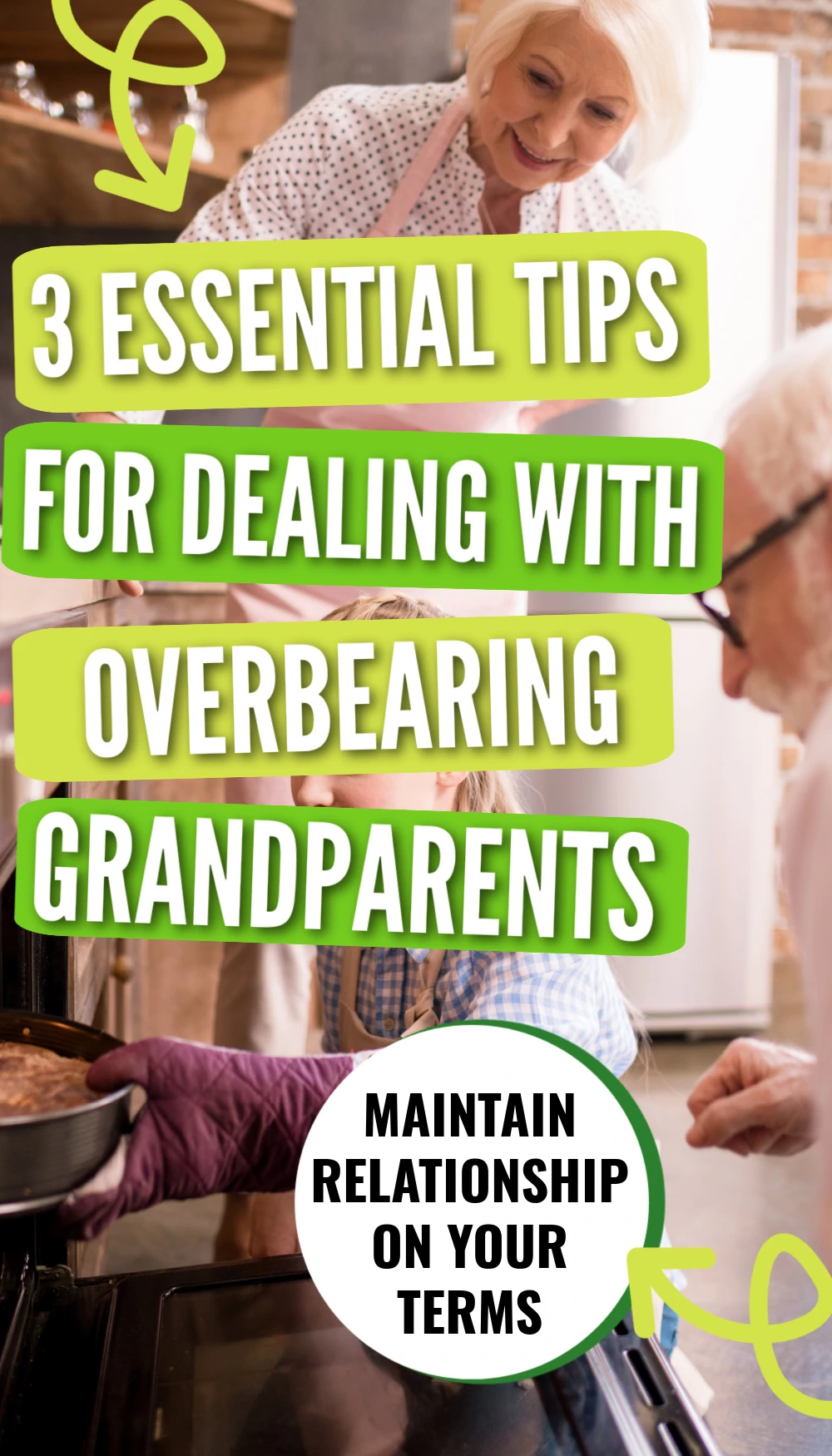Inside: Dealing with overbearing grandparents can be challenging and stressful. Here are three ways ways to navigate the challenges so you can still maintain relationship, for your sake and your children’s sake – but on your terms, not theirs.
Having grandparents involved in your children’s lives can be a godsend for many families.
I can attest to this fact. For the most part (be sure to read until the end), my kids’ grandparents have been helpful, courteous and loving over the years.
But I’ve come to terms with the fact that drama-free relationships will never exist in this lifetime, even if on a small or infrequent basis.
We’re talking about humans here: big ones, little ones. And that means lots of thoughts and opinions and emotions in the air.
So it’s important to realize that no matter how great your relationship is with your kids’ grandparents, there will inevitably be times they overstep your boundaries, which will inevitably cause relational tension.
One national poll indicated that 43 percent of parents report disagreeing with grandparents in regards to their parenting choices.
Up to 15% of those parents report limiting the amount of time their child sees grandparents.
So the question seems to be more likely not if, but when, a conflict will arise – and how you’ll handle it when it does happen.
And if you’re already dealing with overbearing grandparents, there are some steps you can take to turn the ship around.

3 Essential Tips for Dealing with Overbearing Grandparents
THIS POST PROBABLY CONTAINS AFFILIATE LINKS. AS AN AMAZON ASSOCIATE, I EARN FROM QUALIFYING PURCHASES. YOU CAN READ OUR FULL DISCLOSURE POLICY HERE.
Most of us want to maintain relationship with our parents.
We want our children to know their grandparents, and we desperately need the support extended family offers.
It IS possible to stay connected and establish a healthy relationship with pushy grandparents. But it will require a lot of strong boundary-setting on your part.
Remember: setting clear boundaries is about you stating your boundary and knowing what you will do if they are broken.
Related: Grandparents Want to Visit Much? Here’s How to Handle It
1. Be direct.
The hardest part is usually the most obvious, and that requires being direct with your concerns and expectations.
Coming from a person who avoids conflict like a pro, this can be a real struggle.
Now, there is a difference between simple personality clashes and truly overbearing grandparents.
For instance, you may be able to grin and bear it when Grandma or Grandpa is a little dramatic about their childrearing opinions.
But when an opinion turns into constant nagging or worse – overriding your instructions while babysitting, for instance – this is crossing into problematic territory.
Say Grandma randomly decides to add rice cereal to the baby’s bottle because “It’s what I always did”. Unless you have endorsed this practice, you just might come home from date night seeing red.
In these types of scenarios, it’s really important to directly address the issue.
Note: It IS possible to be direct and gracious at the same time!
You could say something like…
“We love that you want to watch Elijah to give us a night out, and we want you to be able to spend time with him.
However, we do not want anything added to his bottle for any reason.
Next time, please be sure to call us if you have any questions about the feeding routine that we discussed.”
Of course, this is assuming it’s the first time something like this has happened, and that your relationship is otherwise agreeable with the grandparent.
If there is a long history of ignoring your wishes and you do not feel safe leaving your child with them – that’s another story.
Always trust your instincts (and observable behavior patterns) when it comes to your child’s safety.
Read More: How Often Should Grandparents Babysit? What to Consider BEFORE Asking
2. Be clear.
It is possible that you are already being direct in your expectations but you need to communicate them even more clearly.
There was a time that I had an older grandparent who was babysitting my daughter a few days a week when I was between sitters.
I was realistic in the sense that I knew the rules were always relaxed at Grandma’s, and this was a short-term arrangement. Not to mention, I really appreciated her willingness to help out in a pinch!
I would directly tell her the routine we followed and asked her to limit sweets. That was about it.
What I didn’t realize was that what I meant by “limit” was quite different from Grandma’s interpretation.
In her mind, fruit juice and fruit snacks fell into the “healthy” category, not sweets. So, they were pretty much given out on-demand.
We had quite the overstimulated toddler during that time! But, we knew she was loved… and at least the sugar rush was temporary.
This brings up another point, which is that some grandparents truly aren’t trying to be overbearing and go against your wishes.
They just might not realize how important some expectations/boundaries are for your family’s health and well-being unless you clearly spell out the why’s behind them.
They’ve probably never dealt with the kinds of parenting challenges you’re dealing with, so they won’t know unless you tell them.
3. Be consistent.
People hear what you do more than what you say – whether we’re talking about grandparents or kids.
So when you do set boundaries with a clearly over-involved, pushy grandparent, you have to be willing to follow through with them.
So when you’ve made it clear that your kiddos have to be in bed by a certain time, but they keep dropping by late anyway? Time for some tough love.
Tell them they can come back during waking hours.
Maybe you have other rules in place for your family that they see as silly or unnecessary. Or worse, they’ve tried to convince your kids your rules don’t matter when they’re around (ouch).
The sooner you enforce those boundaries with consequences you’ve chosen in advance, the sooner they will respect your authority as the parent.
…assuming they are fairly reasonable and just needed a little prodding towards acceptance of those boundaries, that is.

Setting Extreme Boundaries with Over-Involved, Overbearing Grandparents Is Sometimes (Sadly) a Necessity
Usually after you have your first child, it doesn’t take long to see how the grandparent dynamic will play out.
Some grandparents are very predictable.
If they’ve always been aware of boundaries and are respectful of them, they will likely continue that trend.
And if they’ve been meddling or controlling as long as you’ve known them, unfortunately, they aren’t likely to change their ways when they become grandparents.
What does change is that when we become parents, we become hyper-aware of the influence of these relationships on our kids.
We are their first line of defense, after all, as we are the ones entrusted with their ultimate care and well-being.
In a perfect world, grandparents would understand that we are doing our best to carry out this important task, imperfect as we are.
And they would also attempt to transition from parent to grandparent: a source of wisdom and encouragement, while allowing us the autonomy of making our own parenting choices.
As we all know, this isn’t a perfect world, and there are no perfect people.
When “imperfect” crosses the line to harmful, though, it may be time to reevaluate the time spent with the overbearing grandparent(s).
You may still want to allow your kids a relationship with each of their grandparents, but that may look different depending on each situation.
For instance, you might decide that short or more infrequent visits are essential to your family’s mental health and safety.
Real Life Example
I mentioned that for the most part, we have wonderful, caring grandparents. And that is exactly what I expected in my idealistic viewpoint as a young mom.
Despite the fact that my husband had a strained relationship with his parents before we were married, I naively assumed we could work through the tension and be close after our littles arrived.
It wasn’t long after my firstborn entered the world that we realized we would have to settle for those shorter visits on our terms, because – for a variety of reasons – that was what was best for our kids.
We can invite them to our home for holidays and birthdays (especially in larger group settings), but power struggles and unresolved past hurts tend to cause a huge rift if we initiate much more than this.
One thing I had to understand early on is that generational trauma can create a desire in an individual to tightly control anyone and everything around them.
And when they are unable to exert control or dictate the terms of the relationship, it is almost impossible to expect healthy interactions when you do spend time together.
So in our case, we do what we can to allow our kids to know their grandparents within the limitations we have had to put in place.
In addition, as our kids have grown, we have attempted to explain these boundaries to our kids in an age-appropriate way.
We don’t want to enforce a negative view of their grandparents, but we simply have to help them understand that some relationships function differently than others, and that’s ok.

Loving the Grandparents You Have, Even Pushy, Overbearing Ones
I repeat: there are no perfect people.
Parents, grandparents, kids – we are all works-in-progress. We all come to the table with different personalities, preferences, expectations and histories.
There is a caution, I think, to avoid jumping on the “toxic” train and writing off those grandparents who might just think a little differently than we do.
Today’s culture, while being mindful of mental health, is sometimes too quick to urge us to label every slightly impaired relationship as toxic and not worth pursuing.
While we do want to be wise and discerning where there are red flags present, we should not let fear dictate our parenting decisions in a general sense.
Knowing this, we can extend grace and love even with difficult, overbearing grandparents.
We can do our best to communicate our parenting philosophies and what we will and won’t allow.
We can put healthy boundaries in place and enjoy our extended families, whether it’s frequently or on a more occasional basis.
The point is that we won’t always make the right decisions, and sometimes we will find that there are adjustments to be made to protect our kids, our immediate family dynamic, and to preserve those grandparent relationships as best we can.

Ultimately, All Relationships Take Work, And Grandparent Relationships Are No Different
Finding balance can be tricky, but there are two extremes to avoid.
Don’t be the doormat a pushy grandparent steps right over on the way to exerting their will over your child and family.
At the same time, try to extend an olive branch when you can and look for ways to find common ground whenever possible. Everyone benefits from a relationship built on honesty and grace.
Try to keep in mind that often grandparents are new to this whole grandparenting thing. Just like you’re new to this whole parenting thing.
Give them a chance to learn and grown and change.
And what happens if the care and consideration you’ve given isn’t returned by an overbearing grandparent?
In that case, if you do end up having to cut off – or extremely restrict – the relationship, at least you’ll know in your heart that you did everything you could to avoid it.
Read Next: Grandparents Buying Too Many Gifts? Here’s How to Handle It

Brandi is a mom of four who can usually be found in the kitchen, the garden, or under a pile of laundry somewhere. She writes about faith, family and homemaking at Chicken Scratch Diaries. You can catch her most recent posts on Pinterest.